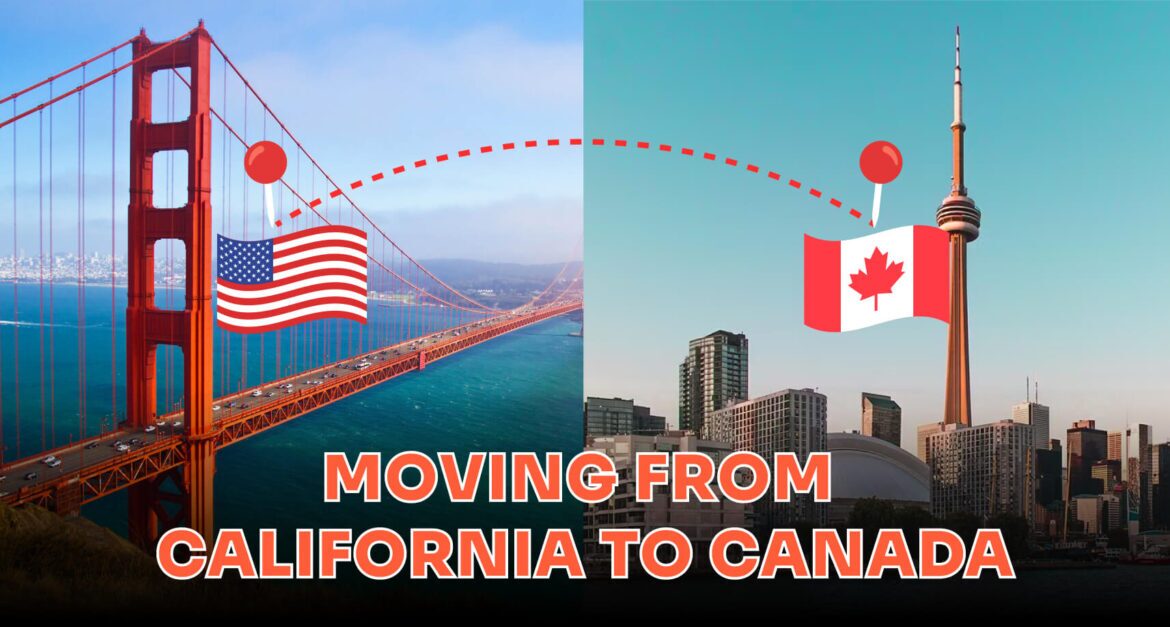No products in the cart.

March 01, 2025
Thinking about moving to Canada from California? Migrating is often fuelled by a country’s strong economy, universal healthcare facilities, and beautiful landscapes. This guide will inform you on everything that requires planning, such as visa requirements, moving costs, customs regulations, and climate adjustments.
Why Move from California to Canada? The Allure of the North
The Golden State is predominantly known for its beaches, perfect weather, and technology opportunities, but the fast-paced lifestyle and high cost of living make it hard for some to adjust. However, Canada is known for its work-life balance, warm hospitality, and affordable healthcare.
A new beginning, education, or work opportunities are all valid reasons for choosing Canada. The presence of major cities such as Vancouver and Toronto symbolises a robust economy along with natural beauty, quality education, and safety, making Canada perfect for families.
Another main reason Canadians prefer over Americans is the lower range of housing prices. Ottawa, Edmonton, and Halifax offer much lower prices than California’s steadily increasing real estate market. Although Vancouver and Toronto tend to be on the expensive side.
Visa and Immigration Nuances: The Law’s Necessities
To relocate to Canada from the United States, you need specific visas or residency permits. Unlike relocating within the US, which is much simpler. But do not worry. Canada has custom immigration options for skilled workers, students, and business people; therefore, it is smart in immigration.
1. Ways of Seeking Permanent Residency
If you want to live in Canada for a long period, then you should consider applying for permanent residency (PR). The most popular option out of many is the Express Entry Program, which provides Express Entry to the immigrants based on their level of work experience, education, and language.
The other option is the Provincial Nominee Program (PNP), which allows different provinces to nominate skilled workers they require. If you have relatives in Canada, you can use the family sponsorship as well.
2. Temporary Business and Student Visas
Work permits and study visas can be your approach when looking for temporary residency. If you are a Californian working in the engineering, technology, or health sectors, you very well might qualify for Canada’s Global Talent Stream Program that allows easier visa acquisition. Those helped with education can apply for the Post-Graduation Work Permit after studying at the Canadian University.
Consulting a Canadian aid is advisable because immigration and visa laws are nuanced and identifying the most effective route can be hard.
How Much Does It Cost to Move from California to Canada?
Shifting jurisdictions is not merely about placing your belongings in a box. There are moving services, transportation, customs charges, and other travel expenses to consider.
1. Estimated Moving Costs
Moving to Canada from California comes along with various factors like distance, methods, and level of shipment. Here’s a general estimation:
Full-Service Movers
$5,000 – $10,000
Moving Container
$3,000 – $6,000
Rental Truck
$2,000 – $4,500
2. Additional Expenses
Other than the relocation expenses, the following must also be taken into account:
- Customs Charges: Some goods purchased elsewhere may be levied taxes when you arrive.
- Storage Charges: Depending on your circumstances, if your new abode is too occupiable, it would require a storage container.
- Housing Expenses: The purchase or rental price is extremely subjective based on the region.
- Travel Charges: Faith in plane tickets, fuel, hotel stays, and meals.
Steering booking issues smartly is possible with the help of an appropriate moving company.
Adjusting to Life in Canada: Climate, Healthcare & Culture
1. Taking Weather into Account
If you’re accustomed to the mild winters of California, prepare yourself for Canada’s extreme weather. Among five places, Vancouver is warmer, but Toronto, Calgary, and Montreal would require heavy snow gear and heaters.
If you are planning to go out, buy good winter clothes like insulated jackets, gloves, and snow boots. If you have to drive, winter tires are necessary, as roads can be icy. Knowing how to deal with winter will facilitate the change.
2. System of Health Care
Another strong factor of attraction, perhaps the strongest, has to do with Canada’s universal healthcare system. In contrast to the US, where health insurance comes provided by an employer, most medical services are included in provincial health insurance plans. New immigrants may have to wait for several months to gain access, however. In the interim, purchasing a private health insurance policy is most important.
Choosing the Best City for Your Move
Canada offers diverse cities with unique lifestyles. Here’s a look at some of the best places to live:
1. Vancouver, BC
- Closest to the California border
- Milder climate compared to the rest of Canada
- High living costs against excellent job opportunities
2. Toronto, ON
- Canada’s largest and strongest job market
- Vibrant multicultural lifestyle
- Cold winters with a lot of indoor activities to do
3. Calgary, AB
- High-salary jobs and affordable housing
- Growing oil, gas, as well as tech industries
- Lower taxes but colder region
4. Montreal, QC
- Cost of living is at least 15% lower compared to Von and Vancouver
- Exotic food and immense culture with strong presence of arts
- Province that predominantly speaks French (Good to learn French)
Depending on your needs, such as employment, price ranges, or the weather, will help you decide which city is best for you.
Final Thoughts: Ready to Make the Move?
Moving from California to Canada can be a huge adjustment in lifestyle; however, with proper planning, it is a seamless process. When moving, ensure that you have a visa, relocation expenses, as well as adapting to a new weather, and you will adjust fast. Looking for specialists? Don’t worry, Safeway Moving Inc. is here to handle international moves so you can sit back and relax. Ready to make the leap to Canada? Get your free quote now!
Desiree
By thinking on behalf of our clients every daywe anticipate what they want provide what they need & build lasting relationships.










